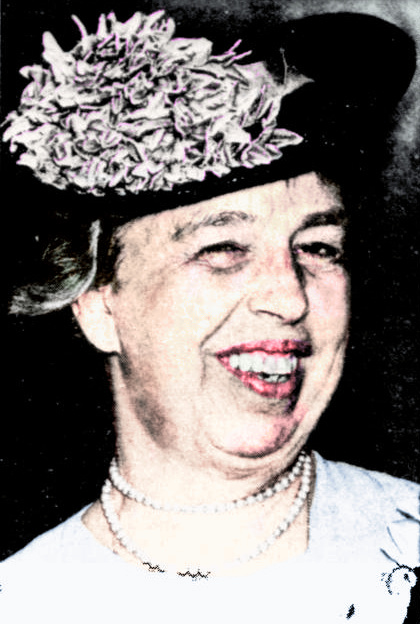
MY DAY
By Eleanor Roosevelt
March 1, 1941
Washington, Friday –
We flew back from New York City yesterday morning and I thought I noticed a certain reticence when I asked if they had any news about Captain Rickenbacker. Everytime we have an accident of that kind, I regret it, because while, on a percentage basis, there are probably as few accidents in flying as there are in other methods of transportation, still mishaps in the air are always more dramatic and one feels that there should be some way of avoiding them.
There have been a number of Army and Navy mishaps, too, lately, and I wonder if we are paying as much attention as we should to the development and experimentation of every possible safety device. Failures that exist because of the human element cannot be controlled, but if in any way we neglect to experiment with anything which might make for greater safety either in the fighting services or on commercial lines, I think it retards development in a line of transportation which is of great importance to the future.
In the afternoon, I spent two hours with a group interested in the development of guidance services for young people in rural areas. These services are developing more rapidly for young people in city schools and in city employment offices, and yet it seems more important in rural areas because so many young people must leave known surroundings to go to unknown places.
I was interested to find that health conditions in rural areas were mentioned so often in the discussion. I am beginning to think that one of the things we need to stress is a community responsibility in the remedying of physical defects during the years of school attendance. There also seemed to be emerging from the general discussion the fact that we, as a people, often see particular things which need to be done and go ahead and do it. But we neglect to go back to the causes which brought about this particular need and do not think forward to the ultimate end we have in view.
One of the best government programs, the CCC, is a good example of this. We have not yet really faced the problem which brought us the CCC camps and the NYA, namely, the lack of employment opportunities for young people. Careful investigation might lead us to all kinds of conclusions even to a reconsideration of our educational system in certain of its phases. As a nation we don’t face the problem.
Secondly, we haven’t followed through to the next step after CCC camp employment and training. Boys are healthier. They have had a period of employment. They have received some training. But what next? We still haven’t solved that problem of unemployment.
We saw some excellent pictures last evening, taken by Dr. William Mann on his trip to Africa. Mr. Dwight Long of Seattle, Wash., showed us some of his trip in a 32-foot sailing boat. He has sailed to many interesting places and his pictures and talk were fascinating.
We have snow today, and I thought we had said good-bye to winter! It makes the view from my windows very lovely and perhaps we are going to have that March blizzard which nearly always turns up!